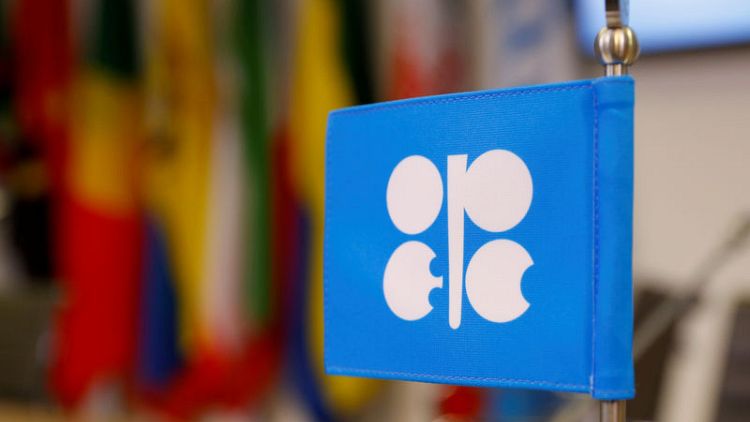By Alex Lawler
LONDON (Reuters) - OPEC oil output has risen in August for the first month this year as higher supply from Iraq and Nigeria outweighed restraint by top exporter Saudi Arabia and losses caused by U.S. sanctions on Iran, a Reuters survey found.
The 14-member Organization of the Petroleum Exporting Countries has pumped 29.61 million barrels per day (bpd) this month, the survey showed, up 80,000 bpd from July's revised figure which was the lowest OPEC total since 2014.
The survey indicates Saudi Arabia is not deviating from its plan of restraining output by more than called for by an OPEC-led supply deal to support the market. Despite calls this year from U.S. President Donald Trump on OPEC to raise output, the producers renewed the supply pact in July.
OPEC's supply curbs should eventually start to support the price of crude <LCOc1>, which has fallen from a 2019 high above $75 a barrel in April to $61 on Friday on concern about slowing oil demand and economic growth, analysts at Commerzbank said.
"Even the moderate demand growth that can be expected is likely – given the considerable production discipline shown by OPEC – to result in an ongoing tightening of supply and to support rising prices," Commerzbank analyst Eugen Weinberg said.
OPEC, Russia and other non-members, known as OPEC+, agreed in December to reduce supply by 1.2 million bpd from Jan. 1 this year. OPEC's share of the cut is 800,000 bpd, to be delivered by 11 members and exempting Iran, Libya and Venezuela.
In August, the 11 OPEC members bound by the agreement, which now runs until March 2020, achieved 136% of pledged cuts, down from 150% in July, the survey found. Two of the three exempt producers pumped less oil.
The biggest supply boost of 80,000 bpd came from Nigeria, Africa's largest exporter, which is seeking a higher OPEC quota and in August continued to produce above its target by the largest margin.
The second-largest rise of 60,000 bpd came from Iraq, which boosted exports from both its northern and southern outlets according to the survey.
Smaller increases came from Libya, where the country's largest oilfield, El Sharara, resumed output on or around Aug. 8 following an outage. Kuwaiti output climbed slightly while remaining below its quota, the survey found.
Saudi Arabia, which in July cut supply even further below its OPEC target in a bid to reduce inventories, has kept output at a similar rate in August. The survey pegged Saudi production at 9.63 million bpd, down from its quota of 10.311 bpd.
Fellow Gulf producer the United Arab Emirates also kept output flat and below its target.
Among countries with lower output, Iran posted the largest decline of 50,000 bpd.
The United States reimposed sanctions on Iran in November after pulling out of a 2015 nuclear accord between Tehran and six world powers. In a bid to cut Iran's sales to zero, Washington in May ended sanctions waivers for importers of Iranian oil.
In Venezuela, supply fell slightly due to the impact of U.S. sanctions on state oil company PDVSA and a long-term decline in production, according to the survey.
July's output was the lowest by OPEC since March 2014, excluding membership changes that have taken place since then, Reuters surveys show.
The Reuters survey aims to track supply to the market and is based on shipping data provided by external sources, Refinitiv Eikon flows data and information provided by sources at oil companies, OPEC and consulting firms.
(Additional reporting by Rania El Ghamal; Editing by Edmund Blair)



